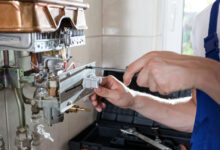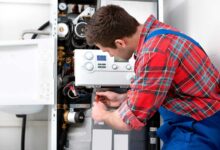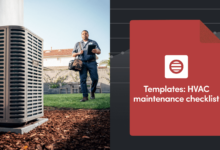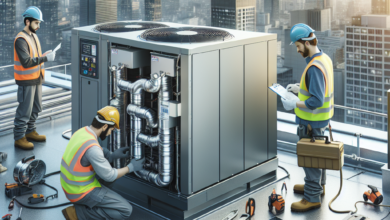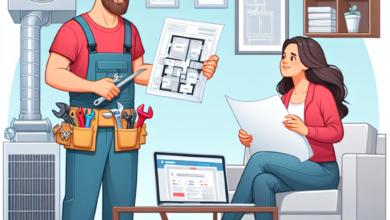HVAC Maintenance Schedule
HVAC Maintenance Schedule – Proper HVAC maintenance is crucial for the smooth functioning and longevity of your heating, ventilation, and air conditioning system. Without regular upkeep, your HVAC system can become inefficient, leading to higher energy bills and potential breakdowns. In this comprehensive guide, we will delve into the importance of a well-maintained HVAC system and provide you with a detailed schedule to ensure optimal performance.
Whether you are a homeowner or a business owner, understanding the significance of HVAC maintenance is essential. Neglecting regular maintenance can result in issues such as reduced airflow, uneven heating or cooling, and even indoor air quality problems. By following a well-structured maintenance schedule, you can not only prevent these problems but also extend the lifespan of your HVAC system, saving you money in the long run.
Understanding HVAC Maintenance
Proper understanding of HVAC maintenance is key to implementing an effective schedule that keeps your system running smoothly. HVAC maintenance involves a range of tasks aimed at ensuring optimal performance, energy efficiency, and indoor comfort. By conducting regular maintenance, you can identify potential problems early on, prevent costly breakdowns, and extend the lifespan of your HVAC system.
The Purpose of HVAC Maintenance
The primary purpose of HVAC maintenance is to keep your system operating at its best. Regular maintenance allows you to identify and address any issues before they escalate into major problems. It also helps improve energy efficiency, reducing your utility bills. Additionally, proper maintenance ensures that your HVAC system provides consistent and comfortable indoor conditions, promoting a healthy and productive environment.
Components Involved in HVAC Maintenance
HVAC maintenance involves several key components that require attention. These include air filters, coils, ductwork, refrigerant levels, electrical connections, and more. Each component plays a crucial role in the overall performance of your HVAC system. By inspecting and maintaining these components regularly, you can optimize efficiency and prevent potential malfunctions.
Monthly Tasks
Performing monthly tasks is essential to ensure that your HVAC system operates smoothly. These tasks focus on preventing issues that could hinder performance and efficiency. By completing these tasks on a monthly basis, you can address minor problems before they become major headaches.
Changing Air Filters
One of the most important monthly tasks is changing the air filters. Dirty and clogged filters can restrict airflow, reducing the efficiency of your HVAC system. By replacing filters regularly, you can ensure proper airflow and maintain good indoor air quality. Check the manufacturer’s recommendations for the filter type and frequency of replacement.
Inspecting Ductwork
Ductwork plays a vital role in delivering conditioned air throughout your home or building. Inspect the ductwork for any leaks, cracks, or loose connections that could lead to air loss. Sealing these issues promptly can improve efficiency and ensure consistent airflow to all areas. Consider hiring a professional to perform a more thorough inspection and duct cleaning if necessary.
Cleaning Condenser Coils
The outdoor unit of your HVAC system contains condenser coils that remove heat from the refrigerant. Over time, these coils can accumulate dirt, debris, and even vegetation, hindering their ability to transfer heat efficiently. Regularly clean the condenser coils using a soft brush or low-pressure water spray to maintain optimal heat transfer and prevent strain on the system.
Seasonal Maintenance
Seasonal maintenance focuses on preparing your HVAC system for the demands of each season. Different weather conditions require specific checks and adjustments to ensure optimal performance and efficiency throughout the year.
Summer Preparation
As summer approaches, it’s essential to prepare your HVAC system for the increased cooling demands. Start by checking the refrigerant levels and ensuring that they are within the manufacturer’s recommended range. Inspect the condensate drain and clean it if necessary to prevent clogs. Additionally, clean the evaporator coils and replace the air filters to promote efficient cooling and good indoor air quality.
Winter Preparation
Before the colder months arrive, it’s crucial to prepare your HVAC system for heating. Begin by inspecting the heat exchanger for any cracks or damage that could lead to carbon monoxide leaks. Clean the burners and adjust the flame for optimal combustion. Check and lubricate the blower motor if required. Lastly, replace the air filters to ensure unrestricted airflow and efficient heating.
Annual Professional Inspection
An annual professional inspection is vital to identify any potential issues before they escalate into major problems. While monthly and seasonal tasks can be handled by homeowners, it’s recommended to hire a qualified HVAC technician for a thorough inspection and maintenance.
The Importance of Professional Inspection
A professional inspection goes beyond what homeowners can typically address. HVAC technicians have the expertise and tools to detect underlying issues that may not be apparent to an untrained eye. They can identify worn-out components, potential leaks, electrical problems, and more. A professional inspection provides peace of mind and ensures that your system is in top condition.
Maintenance Recommendations
After the inspection, the HVAC technician will provide maintenance recommendations based on their findings. This may include repairs, component replacements, or adjustments to optimize performance and efficiency. Following these recommendations promptly can prevent costly breakdowns and extend the lifespan of your HVAC system.
Troubleshooting Common HVAC Problems
Even with regular maintenance, HVAC systems can encounter problems. Understanding common issues and knowing how to troubleshoot them can save you time and money. By addressing these problems early on, you can prevent further damage and restore optimal performance.
Strange Noises
If you notice unusual noises coming from your HVAC system, it could indicate a problem. Rattling, banging, or squealing sounds may suggest loose or worn-out components. Check for loose screws, tighten connections, and lubricate moving parts where necessary. If the problem persists, it’s best to contact a professional technician to diagnose and resolve the issue.
Uneven Cooling or Heating
If certain areas of your home or building experience uneven cooling or heating, it may be due to airflow restrictions, duct leaks, or improper equipment sizing. Check for blocked vents, clean or replace air filters, and ensure that the dampers in the ductwork are properly adjusted. If the problem persists, consult with an HVAC professional to assess and rectify the issue.
Frequent Cycling
If your HVAC system frequently turns on and off, it could be a sign of an underlying problem. Check the thermostat settings to ensure they are correctly configured. Dirty air filters, refrigerant leaks, or faulty thermostat sensors can also cause frequent cycling. Clean or replace filters, check for refrigerant leaks, and consider contacting a professional if the issue persists.
Energy Efficiency Tips
Optimizing energy efficiency not only reduces your utility bills but also contributes to a greener environment. By implementing energy-saving practices, you can minimize energy waste and maximize the performance of your HVAC system.
Utilize Programmable Thermostats
Programmable thermostats allow you to set different temperature levels throughout the day, ensuring that your HVAC system operates at optimal settings when needed. Adjust the temperature settings based on occupancy and time of day, reducing unnecessary energy consumption. Consider upgrading to a smart thermostat that can learn your preferences and adjust settings automatically.
Seal Air Leaks
Air leaks in your home or building can lead to significant energy loss. Inspect windows, doors, and any other potential openings for drafts. Seal these gaps using weatherstripping or caulking to prevent air infiltration. Proper insulation in walls, attics, and basements also helps maintain consistent indoor temperatures and reduces the load on your HVAC system.
Upgrade to Energy-Efficient Equipment
If your HVAC system is outdated or inefficient, consider upgrading to energy-efficient equipment. Look for systems with high SEER (Seasonal Energy Efficiency Ratio) ratings for air conditioners and heat pumps, and high AFUE (Annual Fuel Utilization Efficiency) ratings for furnaces. Energy-efficient equipment can significantly reduce your energy consumption and provide long-term cost savings.
Extending the Lifespan of Your HVAC System
By implementing proactive measures, you can significantly extend the lifespan of your HVAC system. Regular maintenance, proper ventilation, and timely repairs are key factors that contribute to the longevity of your system.
Regular Maintenance
Following a comprehensive maintenance schedule, including monthly tasks and professional inspections, is vital for system longevity. Regular maintenance helps identify and address minor issues before they lead to major breakdowns. By keeping your HVAC system in excellent condition, you can enjoy reliable and efficient performance for years to come.
Proper Ventilation
Proper ventilation is essential for the health and efficiency of your HVAC system. Ensure that vents and registers are not blocked by furniture or other obstructions. Clean the vents regularly to prevent dust and debris buildup. Adequate ventilation allows for proper airflow, reduces strain on the system, and helps maintain consistent indoor air quality.
Timely Repairs
Addressing HVAC system issues promptly is crucial to prevent further damage and costly repairs. If you notice any signs of malfunction, such as unusual noises, decreased performance, or increased energy bills, don’t hesitate to contact a professional technician. Timely repairs can prevent minor issues from escalating into major problems, saving you both time and money in the long run.
Importance of Indoor Air Quality
Indoor air quality (IAQ) has a significant impact on the health and well-being of occupants. Poor IAQ can lead to various respiratory issues, allergies, and discomfort. Maintaining good indoor air quality is a crucial aspect of HVAC maintenance.
The Impact of Poor Indoor Air Quality
Poor indoor air quality can result from a variety of factors, including dust, pollutants, allergens, and volatile organic compounds (VOCs). Breathing in these contaminants can lead to respiratory problems, exacerbate allergies, and impact overall health and comfort. It’s important to address IAQ concerns to create a healthy and productive indoor environment.
Using Air Purifiers
Air purifiers are effective tools for improving indoor air quality. They work by removing contaminants from the air, such as dust, pollen, pet dander, and odors. Consider installing air purifiers in high-traffic areas or rooms where occupants spend a significant amount of time. Regularly clean or replace the filters in air purifiers to maintain their effectiveness.
Regular Filter Replacements
Regularly replacing air filters is crucial for maintaining good indoor air quality. Filters capture dust, allergens, and other particles, preventing them from circulating through your HVAC system. Over time, filters become clogged, reducing their efficiency and restricting airflow. Check your filters monthly and replace them as recommended by the manufacturer.
The Cost of Neglecting HVAC Maintenance
While regular HVAC maintenance requires time and effort, neglecting it can have costly consequences. The financial implications of neglecting maintenance far outweigh the investment of keeping your HVAC system in top condition.
Increased Energy Bills
A poorly maintained HVAC system consumes more energy to achieve the desired indoor conditions. Clogged filters, dirty coils, and other neglected components lead to reduced efficiency, resulting in higher energy bills. By investing in regular maintenance, you can optimize energy efficiency and save on your monthly utility expenses.
Costly Repairs and Breakdowns
Neglected HVAC systems are prone to breakdowns and costly repairs. Minor issues that go unaddressed can escalate into major problems, requiring extensive repairs or even system replacement. By investing in preventive maintenance, you can catch and resolve minor issues before they lead to significant breakdowns, saving you from unexpected expenses.
Premature System Replacement
Neglecting maintenance can significantly shorten the lifespan of your HVAC system, leading to premature replacement. Replacing an entire HVAC system is a substantial financial investment. By implementing a comprehensive maintenance schedule, you can extend the lifespan of your system and delay the need for replacement, saving you money in the long run.
Creating Your Personalized HVAC Maintenance Schedule
Creating a personalized HVAC maintenance schedule tailored to your specific needs is crucial for keeping your system in optimal condition. By following a well-structured schedule, you can ensure that all necessary tasks are performed at the appropriate intervals.
Determining Frequency of Tasks
The frequency of HVAC maintenance tasks may vary depending on factors such as usage, location, and system age. Determine how often tasks such as filter changes, inspections, and cleaning should be performed based on manufacturer recommendations and professional advice. Consider factors like heavy usage periods, seasonal demands, and environmental conditions.
Setting Reminders
Consistency is key when it comes to HVAC maintenance. Set reminders for each task in your maintenance schedule, whether it’s on your calendar, smartphone, or using reminder apps. This ensures that you don’t overlook any important maintenance tasks and helps you stay on track with your schedule.
Documenting Maintenance Activities
Keep a record of all maintenance activities performed on your HVAC system. This documentation serves as a reference for future maintenance and helps you track any recurring issues or patterns. It can also be useful when selling your property or for warranty purposes.
In conclusion, a well-maintained HVAC system is essential for optimal performance, energy efficiency, and cost savings. By following the comprehensive maintenance schedule outlined in this guide, you can ensure that your HVAC system operates smoothly, extends its lifespan, and consistently provides comfortable indoor conditions. Remember to adapt the schedule to your specific needs and seek professional assistance when necessary. By investing time and effort in regular HVAC maintenance, you will enjoy the benefits of a reliable, efficient, and long-lasting system.
